Items filtered by date: January 2023
Symptoms of an Ingrown Toenail
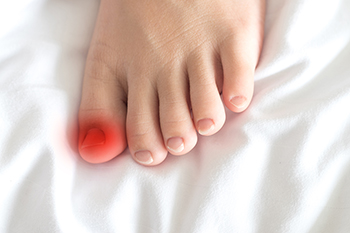
Ingrown toenails are generally painful and can become infected when medical attention from a podiatrist is not promptly sought. Ingrown toenails can develop from wearing shoes that do not fit correctly, or when the toenails are trimmed improperly. An ingrown toenail is defined as a toenail that grows into the skin instead of over it. The symptoms many people experience include the surrounding skin becoming red and tender, in addition to pus oozing from the toenail once it becomes infected. Some patients have found mild relief when the affected toe is soaked in warm water, followed by using a small piece of cotton to gently pull the nail away from the skin, however, these are temporary solutions. If you have developed an ingrown toenail, please schedule an appointment with a podiatrist who is qualified to perform minor surgery for complete healing.
Ingrown toenails can become painful if they are not treated properly. For more information about ingrown toenails, contact Dr. Kevin Davis of Davis Foot & Ankle Centers. Our doctor can provide the care you need to keep you pain-free and on your feet.
Ingrown Toenails
Ingrown toenails occur when a toenail grows sideways into the bed of the nail, causing pain, swelling, and possibly infection.
Causes
- Bacterial infections
- Improper nail cutting such as cutting it too short or not straight across
- Trauma to the toe, such as stubbing, which causes the nail to grow back irregularly
- Ill-fitting shoes that bunch the toes too close together
- Genetic predisposition
Prevention
Because ingrown toenails are not something found outside of shoe-wearing cultures, going barefoot as often as possible will decrease the likeliness of developing ingrown toenails. Wearing proper fitting shoes and using proper cutting techniques will also help decrease your risk of developing ingrown toenails.
Treatment
Ingrown toenails are a very treatable foot condition. In minor cases, soaking the affected area in salt or antibacterial soaps will not only help with the ingrown nail itself, but also help prevent any infections from occurring. In more severe cases, surgery is an option. In either case, speaking to your podiatrist about this condition will help you get a better understanding of specific treatment options that are right for you.
If you have any questions please feel free to contact our office located in Springfield, TN . We offer the newest diagnostic and treatment technologies for all your foot and ankle needs.
Flexibility and Running
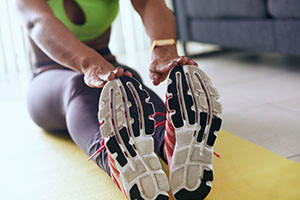
Incurring a running injury can cause physical pain and emotional discomfort. Many people may have to stop their running regime to ensure proper healing and this may be avoided when running injury prevention methods are implemented. Seasoned runners are often aware of the importance of protecting the body while running, therefore injuries may occur more often in runners who are less experienced. The majority of runners have a goal to be pain-free after their running routine is completed and this can be accomplished by properly warming up and cooling down before and after a run. Warming up and cooling down helps prepare the body to be flexible while running, which can also be beneficial in preventing an injury. Additionally, it is wise to gradually increase speed and distance which allows the body ample time to become accustomed to running. Running injuries often affect the feet so if you would like more information about effective prevention methods, please confer with a podiatrist.
All runners should take extra precaution when trying to avoid injury. If you have any concerns about your feet, contact Dr. Kevin Davis of Davis Foot & Ankle Centers. Our doctor will treat your foot and ankle needs.
How to Prevent Running Injuries
There are a lot of mistakes a runner can make prior to a workout that can induce injury. A lot of athletes tend to overstretch before running, instead of saving those workouts for a post-run routine. Deep lunges and hand-to-toe hamstring pulls should be performed after a workout instead of during a warmup. Another common mistake is jumping into an intense routine before your body is physically prepared for it. You should try to ease your way into long-distance running instead of forcing yourself to rush into it.
More Tips for Preventing Injury
- Incorporate Strength Training into Workouts - This will help improve the body’s overall athleticism
- Improve and Maintain Your Flexibility – Stretching everyday will help improve overall performance
- “Warm Up” Before Running and “Cool Down” Afterward – A warm up of 5-10 minutes helps get rid of lactic acid in the muscles and prevents delayed muscle soreness
- Cross-Training is Crucial
- Wear Proper Running Shoes
- Have a Formal Gait Analysis – Poor biomechanics can easily cause injury
If you have any questions, please feel free to contact our office located in Springfield, TN . We offer the newest diagnostic and treatment technologies for all your foot care needs.
Simple Methods That May Ensure Good Foot Care
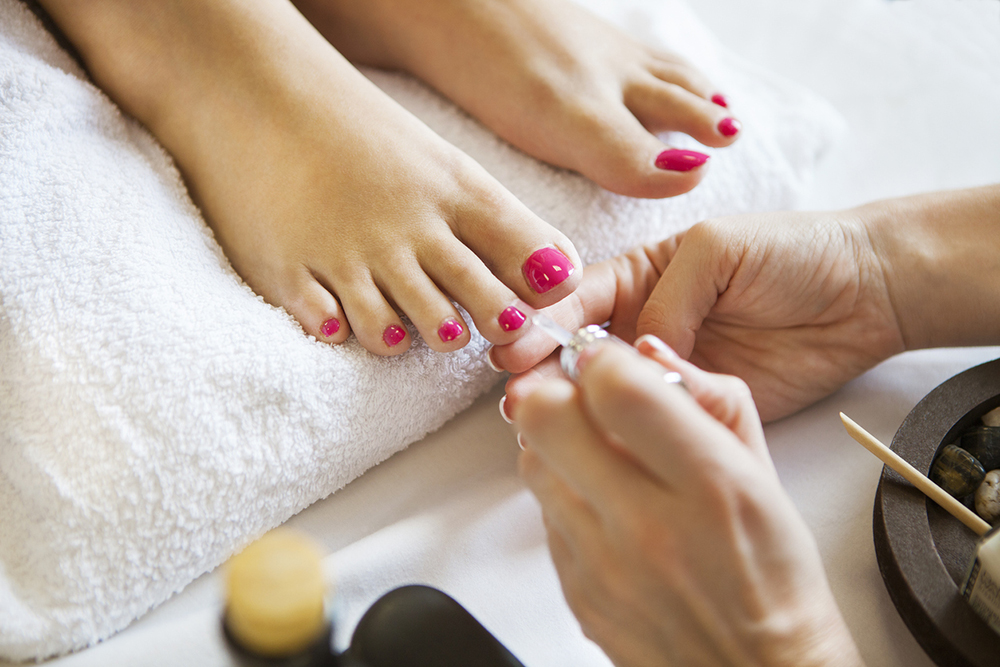
Many people across the globe do not pay as much attention to their feet as advised. It takes a small but persistent amount of time to have feet that look and feel good. An important thing to do is to trim the toenails correctly, approximately once per week. This is an effective method in keeping the toenails strong and healthy. It is beneficial to trim the toenails straight across, followed by filing them to ensure a finished appearance. The feet will feel better when they are frequently moisturized, which may help to prevent cracked heels from developing. When shoes are purchased, it is important that they fit correctly from the moment they are tried on, and they should not have to be broken in. Additionally, it is helpful to shop for shoes at the end of the day when the feet are at their largest. Toenail fungus and athlete's foot may be avoided when the feet are kept as dry as possible, and it is helpful to refrain from wearing shoes without socks. If you would like to have more information on everyday foot care tips, please consult a podiatrist who can provide you with the correct knowledge.
Everyday foot care is very important to prevent infection and other foot ailments. If you need your feet checked, contact Dr. Kevin Davis from Davis Foot & Ankle Centers. Our doctor can provide the care you need to keep you pain-free and on your feet.
Everyday Foot Care
Often, people take care of their bodies, face and hair more so than they do for their feet. But the feet are a very important aspect of our bodies, and one that we should pay more attention to. Without our feet, we would not be able to perform most daily tasks.
It is best to check your feet regularly to make sure there are no new bruises or cuts that you may not have noticed before. For dry feet, moisturizer can easily be a remedy and can be applied as often as necessary to the affected areas. Wearing shoes that fit well can also help you maintain good foot health, as well as making it easier to walk and do daily activities without the stress or pain of ill-fitting shoes, high heels, or even flip flops. Wearing clean socks with closed shoes is important to ensure that sweat and bacteria do not accumulate within the shoe. Clean socks help to prevent Athlete’s foot, fungi problems, bad odors, and can absorb sweat.
If you have any questions please feel free to contact our office located in Springfield, TN . We offer the newest diagnostic and treatment technologies for all your foot and ankle needs.
Reminder: When Was the Last Time...?
Top Causes of Heel Pain in Seniors
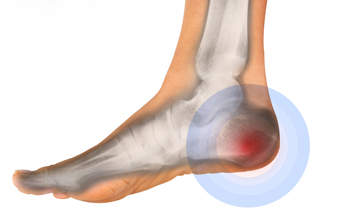
As one ages, pain becomes a common theme, especially in the feet and back of the heel. The most common cause of heel pain is plantar fasciitis, characterized by sharp pain and stiffness in the bottom of the heel. It also may extend under the arch and into the ball of the foot, which can then interfere with walking or carrying out daily activities. Another cause of heel pain is bursitis in the calcaneus, or heel bone, which connects with the plantar fascia. This inflammation causes throbbing pain, particularly after taking off your shoes. Pain increases with each step you take. Other sources of pain at the back of the heel include Achilles tendonitis and Achilles bursitis. Both of these conditions inhibit mobility and can make wearing shoes extremely uncomfortable. If you have pain in the bottom or back of the heel, please visit a podiatrist who can make a professional evaluation of the cause and provide treatment options.
Many people suffer from bouts of heel pain. For more information, contact Dr. Kevin Davis of Davis Foot & Ankle Centers. Our doctor can provide the care you need to keep you pain-free and on your feet.
Causes of Heel Pain
Heel pain is often associated with plantar fasciitis. The plantar fascia is a band of tissues that extends along the bottom of the foot. A rip or tear in this ligament can cause inflammation of the tissue.
Achilles tendonitis is another cause of heel pain. Inflammation of the Achilles tendon will cause pain from fractures and muscle tearing. Lack of flexibility is also another symptom.
Heel spurs are another cause of pain. When the tissues of the plantar fascia undergo a great deal of stress, it can lead to ligament separation from the heel bone, causing heel spurs.
Why Might Heel Pain Occur?
- Wearing ill-fitting shoes
- Wearing non-supportive shoes
- Weight change
- Excessive running
Treatments
Heel pain should be treated as soon as possible for immediate results. Keeping your feet in a stress-free environment will help. If you suffer from Achilles tendonitis or plantar fasciitis, applying ice will reduce the swelling. Stretching before an exercise like running will help the muscles. Using all these tips will help make heel pain a condition of the past.
If you have any questions please contact our office located in Springfield, TN . We offer the newest diagnostic and treatment technologies for all your foot and ankle needs.
Cracked Heels and Old Age
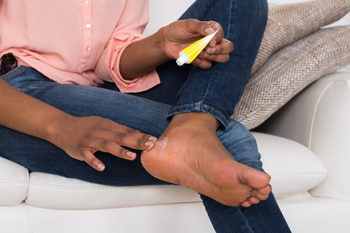
Cracked heels are certainly not the most serious or dangerous condition that can affect your feet, but they can still be nonetheless annoying and uncomfortable. It is important to note that as individuals age they can be more and more susceptible to developing cracked heels. Many things can explain this phenomenon. For one thing, the elasticity that is in the skin can significantly decline as an individual gets older. This can be a contributing factor to cracked heels. The extent to which an older individual can produce moisture in the feet is also significantly lower than almost any given younger person. This is another major potential contributing factor to cracked heels. If you are someone that struggles with cracked heels, be sure to schedule an appointment with a podiatrist today who can help you manage your condition and address the problem.
Cracked heels are unsightly and can cause further damage to your shoes and feet. If you have any concerns, contact Dr. Kevin Davis from Davis Foot & Ankle Centers. Our doctor can provide the care you need to keep you pain-free and on your feet.
Cracked Heels
Cracked heels appear unappealing and can make it harder for you walk around in sandals. Aside from looking unpleasant, cracked heels can also tear stockings, socks, and wear out your shoes. There are several methods to help restore a cracked heel and prevent further damage.
How Do You Get Them?
Dry skin is the number one culprit in creating cracked heels. Many athletes, walkers, joggers, and even swimmers suffer from cracked heels. Age and skin oil production play a role to getting cracked heels as well.
Promote Healing
Over the counter medicines can help, especially for those that need instant relief or who suffer from chronic dry feet.
Wear Socks – Wearing socks with medicated creams helps lock in moisture.
Moisturizers – Applying both day and night will help alleviate dryness which causes cracking.
Pumice Stones – These exfoliate and remove dead skin, which allows for smoother moisturizer application and better absorption into the skin.
Change in Diet
Eating healthy with a well-balanced diet will give the skin a fresh and radiant look. Your body responds to the kinds of food you ingest. Omega-3 fatty acids and zinc supplements can also revitalize skin tissue.
Most importantly, seek professional help if unsure how to proceed in treating cracked heels. A podiatrist will help you with any questions or information needed.
If you have any questions, please feel free to contact our office located in Springfield, TN . We offer the newest diagnostic and treatment technologies for all your foot care needs.

